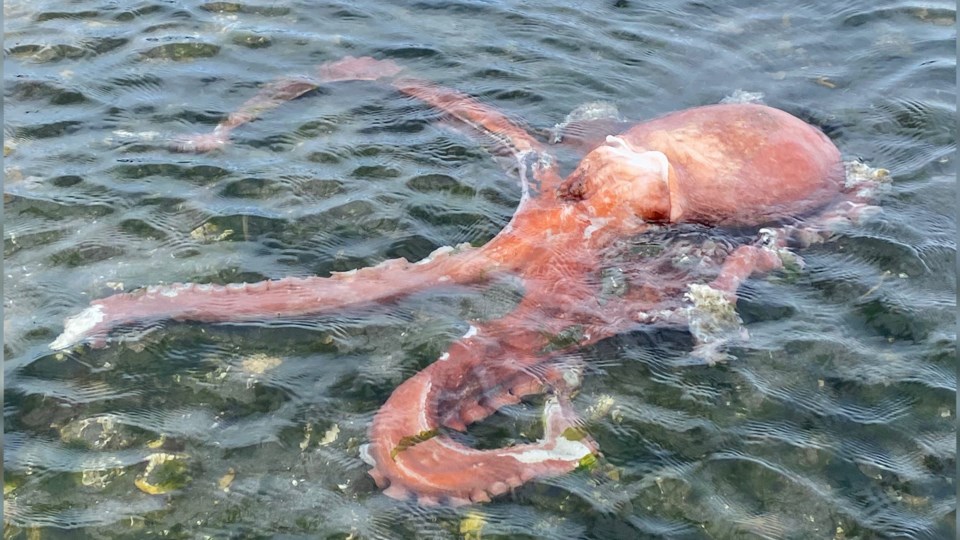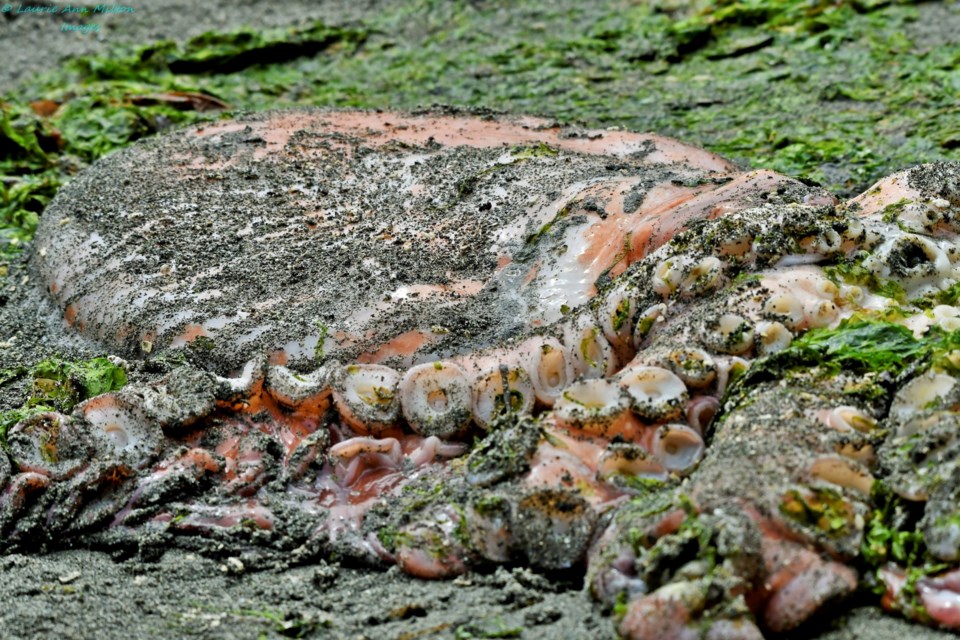A B.C. photographer was strolling a Vancouver Island beach with her dog when she discovered a ‘large orange blob’ washed up on the shore.
"I thought, 'gee, that’s strange,'” says Laurie Milton during an interview with Glacier Media. "At first, I thought it was maybe some old life jackets or something that might be buried in the sand.”
The Shawnigan Lake local has lived on Vancouver Island for more than three decades and was shocked by what she discovered.
Milton was walking out to Cherry Point Beach on May 10 to take some photographs of the wildlife in the area.
“It is a great place to go shoot the eagles and the osprey coming down there to feed on the flounder. There’s a lot of wildlife down there — herons, otters, seals, and sea lions — and we’ve even seen killer whales out in the bay,” she says.
As Milton and her dog got closer they discovered a motionless sea creature.
"I felt my heart break, and I realized right away that this was an octopus, and it was big. It was the biggest I’ve ever come across,” she says. "It’s the first time I’ve seen one washed up on our beaches.”
Milton describes the size of the octopus’s head as two feet wide, and its appendages stretched out to about four feet long.
"The little suction cups were bigger than a toonie. They were big. Not quite the size of my palm, but they were big,” she says.
Milton was accurate in calling the blob ‘large’ as experts have confirmed with Glacier Media that the creature is an Eneroctopus dofleini, also referred to as the Giant Pacific octopus.
University of Victoria biology professor Louise Page says the species can grow so large that it has been called the largest octopus species anywhere.
“They are abundant along the west coast of Canada,” she says.
Milton decided to stop for a moment and document the octopus.
"I was just totally surprised to find this washed up on the beach. I sat there for a minute, took pictures and said, ‘R.I.P., you big giant.’ It was heartbreaking. I am an animal lover,” she says
It turns out its death might have been natural.
Collections Manager of Invertebrates at the Royal BC Museum Hugh MacIntosh also confirmed the species to be a Giant Pacific octopus.
"They are one of only a few octopus species that live in B.C., though their range stretches across the North Pacific to Japan,” he says.
While it is not rare, they are seldom encountered as they are fairly shy, according to MacIntosh.
"They prefer to hide in dens during the day and come out to feed at night,” he says.
Milton has never come across something like it before and is grateful she did.
“It’s a huge creature, and one few people get a chance to see unless they’re divers,” she says. "How do you get a chance to see something magnificent and see these long legs stretched out on the beach?
Deborah Newell was walking her dog at Cherry Point Beach on May 10 when something in the ocean caught her eye.
“I thought, what the heck is that? It looks almost like a lifejacket,” she says.
To her surprise, it was a giant octopus, believed to be the same one Milton saw.
“I thought it was pretty big, it was pretty big,” she says.
Newell believes the creature was dead when she saw it floating in the water near the shore. She took a photograph of the octopus and considers herself lucky to have seen it.
MacIntosh describes them as truly giant, the largest species of octopus in the world, with an arm span up to nine meters long.
"You can get a sense of the size and strength with the thickness of the arms and diameter of the suckers in the photographed specimen,” he says.
Most octopuses only live for a few years.
The Giant Pacific Octopus is no exception and only live for five years and have a “live fast, die young” lifestyle.
"Females in the species put a lot of energy [into] producing a large brood of eggs and diligently care for them for months,” he says. "Once the eggs hatch, the mother dies.”
He wouldn’t consider it unusual to find one washed up dead.
“Just a sign that it’s reached the end of its life, hopefully leaving a new generation of little octopus behind,” says MacIntosh.
Have a tip or want to get in contact with Alanna Kelly? Email [email protected] or contact her on WhatsApp or Signal.




